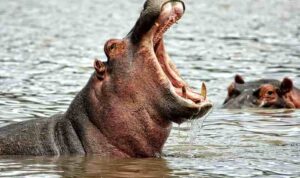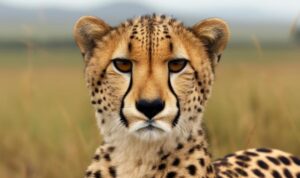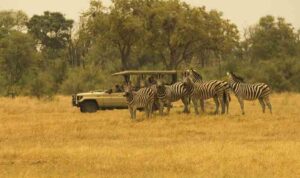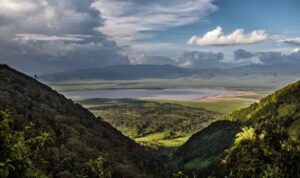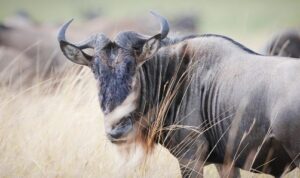Okavango Delta (Botswana) takes center stage as a natural wonderland teeming with diverse flora and fauna, captivating readers with its unique ecosystem and cultural significance. This opening passage beckons readers into a world crafted with good knowledge, ensuring a reading experience that is both absorbing and distinctly original.
The Okavango Delta, located in Botswana, boasts a rich tapestry of biodiversity and cultural heritage, making it a must-visit destination for nature enthusiasts and cultural explorers alike.
Overview of Okavango Delta: Okavango Delta (Botswana)

The Okavango Delta, located in Botswana, is a unique and significant geographical feature in Africa. It is the largest inland delta in the world and one of the few remaining large wetland wilderness areas.
The delta is formed by the Okavango River, which originates in the Angolan highlands and flows southeastward into the Kalahari Desert. Instead of reaching the sea, the river spreads out over the delta, creating a vast network of channels, lagoons, and islands.
Unique Ecosystem and Biodiversity
The Okavango Delta is known for its rich and diverse ecosystem. It supports a wide variety of plant and animal species, including elephants, hippos, crocodiles, and numerous bird species. The delta is a UNESCO World Heritage Site and a crucial habitat for many endangered species.
- The delta is home to over 200,000 large mammals, making it one of Africa’s premier wildlife destinations.
- It is a haven for birdwatchers, with over 400 bird species recorded in the area.
- The unique combination of wetland and dryland habitats in the delta supports a high level of biodiversity.
Formation and Hydrological Characteristics, Okavango Delta (Botswana)
The formation of the Okavango Delta is a result of tectonic activity and climatic changes over millions of years. The delta’s hydrological characteristics are influenced by seasonal flooding from rainfall in Angola, which peaks between June and August.
The floodwaters from the Okavango River spread across the delta, replenishing the wetlands and sustaining the diverse ecosystem.
- The delta’s water levels fluctuate throughout the year, creating a dynamic environment for plants and animals.
- The intricate network of channels and islands in the delta provides unique habitats for a wide range of species.
- The sustainable management of water resources in the delta is crucial to maintaining its ecological balance and biodiversity.
Flora and Fauna

The Okavango Delta is home to a rich variety of plant and animal species, making it a biodiversity hotspot in Africa. Let’s delve into the diverse flora and fauna that thrive in this unique ecosystem.
Plant Species in the Okavango Delta
The Okavango Delta boasts a wide array of plant species, including papyrus reeds, water lilies, and various acacia and palm trees. These plants play a crucial role in providing habitat and food for the diverse wildlife in the delta.
Wildlife Population in the Okavango Delta
The delta is teeming with a plethora of wildlife, from majestic mammals like elephants, lions, and leopards to an impressive variety of bird species such as African fish eagles and herons. Reptiles like crocodiles and various fish species also call the delta home, contributing to its ecological richness.
Conservation Efforts in the Okavango Delta
Efforts to protect the flora and fauna of the Okavango Delta are paramount to ensure the sustainability of this unique ecosystem. Conservation initiatives focus on preserving habitats, combating poaching, and promoting sustainable tourism practices. Organizations and local communities work together to safeguard the delicate balance of nature in the delta, ensuring its continued vitality for future generations.
Cultural Significance

The Okavango Delta holds immense cultural significance for the indigenous communities residing in the region. For these communities, the delta is not just a geographical feature but a sacred place deeply intertwined with their traditions, customs, and way of life.
Traditional Practices and Rituals
The indigenous communities in the Okavango Delta have a rich tapestry of traditional practices and rituals that are closely connected to the delta’s ecosystem. These practices often revolve around the cycles of nature, such as the annual flooding of the delta, which is seen as a symbol of renewal and regeneration. Rituals are performed to honor the spirits of the delta and seek their protection and blessings for the community.
- During the flood season, communities participate in ceremonies to celebrate the abundance of water and the fertility it brings to the land. These ceremonies involve singing, dancing, and offerings to appease the spirits of the delta.
- Traditional healers play a crucial role in the community, using their knowledge of medicinal plants found in the delta to treat ailments and maintain the health of the people.
- Rites of passage, such as initiation ceremonies for young members of the community, often take place in the delta, symbolizing the transition to adulthood and the passing down of cultural heritage.
Impact of Tourism
The rise of tourism in the Okavango Delta region has brought both opportunities and challenges for the cultural heritage of the indigenous communities. While tourism has provided economic benefits and raised awareness about the importance of preserving the delta, it has also led to changes in traditional practices and beliefs.
- Increased tourist activities have sometimes disrupted sacred sites and rituals, leading to concerns about the commercialization and commodification of cultural practices.
- There is a growing need to strike a balance between promoting tourism and safeguarding the cultural integrity of the indigenous communities. Sustainable tourism practices that respect and support local traditions are essential for preserving the cultural heritage of the Okavango Delta.
Activities and Tourism

When visiting the Okavango Delta in Botswana, tourists can partake in a variety of exciting activities that showcase the unique natural beauty and wildlife of the region. From safaris to mokoro excursions, there is something for every nature lover to enjoy.
Popular Activities in the Okavango Delta
- Game Safaris: Explore the delta’s diverse ecosystem and spot iconic African wildlife such as elephants, lions, and hippos.
- Mokoro Excursions: Glide through the delta’s waterways in a traditional dugout canoe, getting up close to birds and aquatic animals.
- Birdwatching: With over 400 bird species, the Okavango Delta is a paradise for bird enthusiasts looking to spot rare and colorful species.
Best Times to Visit and Seasonal Experiences
The best time to visit the Okavango Delta is during the dry season from May to September when wildlife congregates around water sources, making it easier to spot them. However, each season offers a unique experience:
- Winter (May to August): Ideal for game viewing as animals gather around the delta’s waterways.
- Spring (September to November): Witness the delta coming to life with lush vegetation and newborn animals.
- Summer (December to March): Experience the delta in full bloom with vibrant colors and migratory birds.
- Autumn (April): Enjoy the last of the greenery before the dry season sets in.
Accommodation Options in the Okavango Delta
There are various accommodation options available for tourists in the Okavango Delta, ranging from luxury lodges to tented camps. Visitors can choose to stay in:
- Luxury Lodges: Experience ultimate comfort and luxury in exclusive lodges with stunning views of the delta.
- Tented Camps: Embrace a more rustic and authentic safari experience while still enjoying modern amenities.
- Mobile Safari Camps: Move with the wildlife and set up camp in different locations for a truly immersive experience.
In conclusion, the Okavango Delta stands as a testament to the intricate balance of nature and culture, offering visitors a glimpse into a world where conservation efforts, traditional practices, and thrilling activities converge harmoniously. Plan your journey to this enchanting region and immerse yourself in the wonders of the Okavango Delta.

